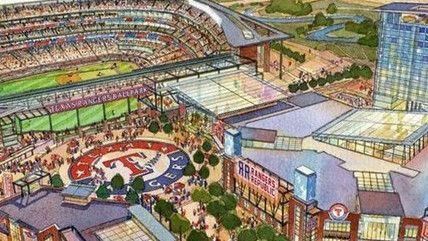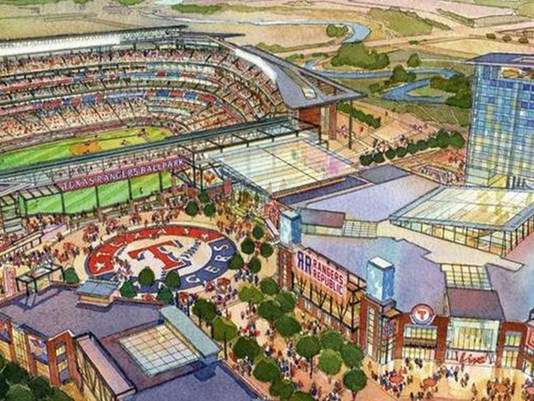Texas Rangers' Proposed Stadium Deal Is Yet Another Loser For Taxpayers
New ballpark could cost taxpayers over $1.6 billion in taxes and lost revenue to replace current one, which is only 22 years old.


Just 22 years ago, Major League Baseball (MLB)'s Texas Rangers opened what was then called The Ballpark in Arlington. Now known as Globe Life Park, the "monument to baseball"—as then-Rangers owner George W. Bush called it—was touted during its opening season as a jewel of a retro stadium that could become one of baseball's eternal parks, like Chicago's Wrigley Field or Boston's Fenway Park, and last 100 years
But instead, the Rangers' stadium seems destined to go the way of the Atlanta Braves' Turner Field, which was abandoned at the end of this season after only two decades in favor or a publicly-financed stadium in Cobb County (Ga.).
As The Ringer's Claire McNear noted, the extraordinarily wealthy sports franchise owners of Texas just can't seem to find a way to build a for-profit building without making the taxpayers assume all the risk:
In the end, The Ballpark cost $191 million, financed largely by taxpayers in the form of a half-cent sales tax increase. Today's proposal for a new new stadium comes with — surprise! — the same half-cent tax bump. Should it be approved, taxpayers will fund the project just as soon as they finish paying for the Cowboys' AT&T Stadium, the most recent sporting venue that Arlington taxpayers have agreed to cover.
The neccessity of the new Rangers' stadium is supposedly due to the oppressive summer heat of North Texas (not exactly a new phenomenon) scaring off customers, hence a new air-conditioned stadium with a retractable roof must be built, so the argument goes.
Though Arlington city officials promised the estimated $1 billion cost of building the new stadium would be a "50-50" public and private split, a WFAA investigation into the fine print of the master agreement between the Rangers and the city revealed what one economics professor referred to as a "sleight of hand" and "verbal gymnastics" over who is actually responsible for what costs. Per the WFAA report:
Tucked in the agreement is a clause called the "admissions and parking tax" that allows for a 10 percent surcharge on event tickets and up to $3 additional surcharge on parking. State law allows cities to collect and use the taxes to build their stadiums. Arlington's agreement, however, allows the Rangers to use the admissions and parking tax revenues to help pay their half of the construction costs.
"If it really is a tax and could be used by the municipality, then in essence it's just transferring revenue from the public sector to the private sector," said Rick Eckstein, a Villanova University professor who studies sports stadium economics.
"There's a sleight of hand here. There's verbal gymnastics going on," Eckstein added. "It's relatively unprecedented in terms of stadiums I've studied over the last 20 years."
Thanks to the "sleight of hand," which allows the Rangers to use tax revenue to pay off their own debts, the team will only be directly responsible for $200 million, making the promised "50-50" split a "80-20" split in favor of the private company which will keep any profits made on the stadium (technically owned by the city of Arlington) for itself.
And (as these projects tend to) it gets worse. A more recent WFAA review of the master agreement found that the Rangers will retain stadium naming rights and all the revenue from seat licenses, both of which could combine for more than $375 million over the next 30 years. WFAA also made a "conservative estimate" that when it's all said and done, the city will probably spend more than $1 billion on its bond debt after interest, fees, and other inevitable costs are added to the mix. And that's a "conservative estimate."
Voters will decide whether or not to accept the bond deal on Election Day in three weeks, with polls showing the yays and nays currently running neck and neck.
Stadium supporter and Mayor of Arlington Jeff Williams is paying no mind to rational thinkers such as economist Robert Baade, who WFAA quotes as saying the Rangers deal "is one of the worst public projects anyone could imagine" or Arlignton taxpayer Jim Runzheimer, who said, "This is a total giveaway by the taxpayer to a private business that does not need any taxpayer assistance."
Williams disagrees with both, offering this rationale: "We are not giving away anything to the Rangers…We are investing with the Rangers."
Read more Reason coverage on the sucker's bet that is publicly-financed sports stadiums here and watch Todd Krainin's great doc about a minor league ballpark boondoggle in Hartford (Conn.) below.
Editor's Note: As of February 29, 2024, commenting privileges on reason.com posts are limited to Reason Plus subscribers. Past commenters are grandfathered in for a temporary period. Subscribe here to preserve your ability to comment. Your Reason Plus subscription also gives you an ad-free version of reason.com, along with full access to the digital edition and archives of Reason magazine. We request that comments be civil and on-topic. We do not moderate or assume any responsibility for comments, which are owned by the readers who post them. Comments do not represent the views of reason.com or Reason Foundation. We reserve the right to delete any comment and ban commenters for any reason at any time. Comments may only be edited within 5 minutes of posting. Report abuses.
Please to post comments


I actually love the existing ballpark anyway.
Why can't I get the state to throw balls of money at me? It seems I'm always throwing balls of money at them. Well, my balls are being kicked while they shake me upside down for my money.
the little anti-grav gnome that kicks your balls while you're hanging upside down ain't cheap.
The government punches down.
C'mon man. Paying for your own shit is for losers. You don't want to be a loser, do you?
Sad!
I'm guessing it's too cost-prohibitive to, I don't know, put a roof on the existing ballpark?
I'm so glad I don't live in Horriblington anymore.
One reason I have respect for Stephen Ross: He spent $500 million of his own money to renovate Dolphins Stadium (Hard Rock Stadium now I guess), putting on a partial roof and making other big renovations. Stadium was originally built 30 years ago by then-owner Joe Robbie with his own money as well.
(compared to that boondoggle that is the Marlins stadium...)
(1 of 2)
Thanks for publicizing the teams that do it on their own. I think in prior Fisher stadium articles others have mentioned the Bay Area (at least the Giants & maybe 9ers?) have also built stadiums privately.
Another structure that went up 22 years ago that was almost entirely privately built (I guess the city chipped in a few million for some infrastructure because you can't trust millionaires with ROADZZZ) was the United Center here in Chicago. Today it is still used for 2 major tenants and I would guess is booked 180 dates a year, meaning big rent, parking and admission dollars for the owners (Bulls & Blackhawks jointly.) The city and county still get their cut in the form of sales taxes on tickets and concessions, and the city gets even more money from Chicago's infamous Amusement Tax. All without the region having had to issue bonds that they would be on the hook for for the next 30 years.
(2 of 2)
The history is that the Bulls' owner had fed at the public trough for his baseball team's new stadium about 5 years earlier, but the Blackhawks had been owner-tenants of the prior building since their inception. So they knew the appeal of having their own place, and were able to talk the Bulls into going along. If I recall they had made their money back in just 7 years.
If you compare that part of the Near West Side to 25 years ago the improvement is amazing. (Some of it would have probably occurred naturally) and also both franchises using the United Center have set down roots by building their own practice facilities nearby, when they formerly were out in the suburbs and essentially just came into the city for their games.
Dear Reason,
Why do you hate sports?
Sincerely,
Progressive 'Merica
It's even dumber in this instance because the Arlington taxpayers are covering the cost for all of the Dallas and Ft. Worth residence as well.
So the Rangers do not value a major piece of infrastructure they got other people to pay for?
That is unthinkable!
Anytime I hear a politician say the word "investing" I reflexively reach for my wallet.
The surrounding parking lots and industrial parks give it that extra charm.